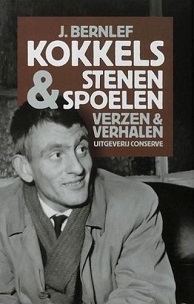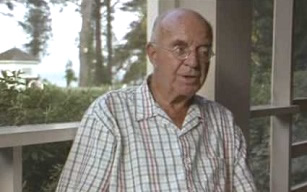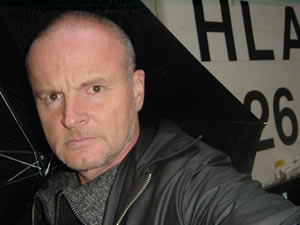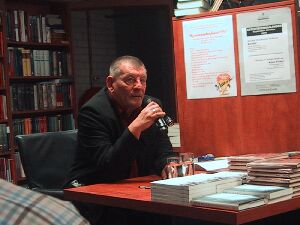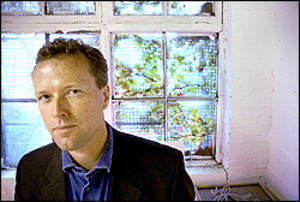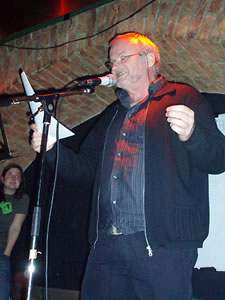De Nederlandse schrijver en dichter J. Bernlef werd geboren op 14 januari 1937 in Sint Pancras. Zie ook alle tags voor J. Bernlef op dit blog..
Uit: Het wonder
“Het gebeurde op een zomeravond, toen ik tien jaar was. Ik kwam net op tijd voor het avondeten thuis en rende naar de keuken om mijn handen te wassen. Mijn moeder was bezig de aardappelen van de pan in een dekschaal te doen en haar gezicht was in een wolk van stoom gehuld.
‘Was je ze goed,’ vroeg ze, maar ik antwoordde niet.
Die middag was er een schoolgevecht geweest. Op een braakliggend terrein in de buurt van de school hadden wij gevochten tegen de jongens van de christelijke school, die een paar straten verderop stond. Ik was doodmoe. Al had ik geen zichtbare verwondingen, ik verbeeldde me, met een gevoel van verzaliging, dat al mijn botten gebroken waren. Mijn spieren deden pijn en ik trok wat met mijn rechterbeen waar ik een schop tegen had gehad, al overdreef ik het trekken natuurlijk wel. Ik kwam dus min of meer hinkend binnen. Mijn vader en mijn broertje zaten al aan tafel. Pietje probeerde zelf zijn slab om te binden, maar liet het lapje ten slotte met een kreet van onmacht voor zich op zijn bord vallen. Mijn vader zat voorovergebogen het vlees te snijden. In een van de ramen van de huizen aan de overkant van de straat zag ik de zon oranje ondergaan. Ik bleef stilstaan en keek naar het hoofd van mijn vader. Op het midden van de schedel zat een langwerpige kale plek aan alle kanten bebost door opspringend zwart haar, als een open plek in het bos omzoomd door struikgewas. Hij had mij niet horen binnenkomen. Ik boog mij voorover, legde mijn wijsvinger als een paar horens naast mijn hoofd en stoof op mijn broertje af, een afschuwelijk gebrul uitstotend. Pietje begon te huilen en verborg zijn gezicht in zijn handen. Mijn vader keek op, verbaasd en direct daarop vermanend.
‘Wil je…’ zei hij, maar hij brak zijn zin af toen mijn moeder binnenkwam en de schalen met aardappels en groente op tafel zette. Ik ging aan tafel zitten en mijn moeder schepte mijn bord vol.
‘Heb je fijn gespeeld,’ vroeg ze terwijl ze het bord voor mij neerzette. Ik propte mijn mond vol en zei:
‘Op het landje.’
Mijn vader keek van zijn bord op, zijn wenkbrauwen optrekkend.
‘Welk landje,’ vroeg hij.
Ik wees met een hand naar het raam. ‘Achter de school,’ zei ik, ‘we hebben gevochten met de Pro Rege. Ze zijn ‘m gesmeerd en die schoften hadden stokken bij hun.’ Ik schoof van opwinding heen en weer over de zitting van mijn stoel. Mijn vader boog zich naar mij toe en tikte met zijn mes één keer scherp tegen de rand van mijn bord. Ik schrok want ik was alweer verloren in de oorlog van een paar uur geleden. Ik snoof weer de geur van vuil zand op, van zuring en visgraten in kranten verpakt, ik hoorde het geschreeuw en zag de blauwe ijsmuts van onze aanvoerder, Jopie de Boer uit de zesde, midden in een krioelende hoop jongens.”
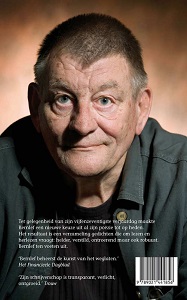
J. Bernlef (14 januari 1937 – 29 oktober 2012)
Cover achterkant
De Vlaamse schrijver en journalist Chris De Stoop werd geboren op 14 januari 1958 in Sint-Gillis-Waas. Zie ook alle tags voor Chris de Stoop op dit blog.
Uit: Dit is mijn hof
“Ik heb er een diepvriezer voor gekocht en eet soms maanden koe tot het me de keel uit komt. Wat des te sneller gebeurt als ik de koe in kwestie nog goed gekend heb.
Uiteindelijk lukt het ons door de weidedraad op een andere plaats helemaal open te maken en de vaarzen zo via een omweg naar het erf te drijven – een vaak beproefde afleidingstactiek.
Mijn broer loopt met een riek hooi voor de beesten uit om hen tot in de stal te lokken. Als de laatste binnen is, doen we haastig de grendel in het slot. We leunen doodmoe tegen de muur, waarvan de onderkant zwart ziet van de mest. We glimmen van het zweet en van het vuil.
Hoewel ik al twintig jaar gestopt ben met roken, rol ik nu een sigaret, samen met hem. Een dunne, want hij is zuinig op zijn tabak en kijkt me op de vingers. We roken en rochelen zonder een woord te zeggen. Alle vee is nu van de wei en alleen de bulldozer blijft buiten achter in de regen, die gaandeweg overgaat in natte sneeuw. Binnen is het behaaglijk tussen de dampende koeienlijven.
Maar we praten niet zoals vroeger met voldoening na over de hele operatie, we rakelen niet eindeloos op hoe hachelijk het wel was en hoe wild ze waren en hoeveel geluk we hadden dat we de beesten weer in de stal kregen, nee.
‘Het boeren is bijna afgelopen,’ zegt mijn broer voor de zoveelste keer, met op zijn gezicht een mengsel van schrik en wrok. ‘Ze willen ons weg.’
‘Nog lang niet,’ zeg ik.
We zwijgen weer en kijken de stal rond, waarin het verval stilaan merkbaar wordt in de kromme buizen en roestige drinkbakken. De koeien zijn al gaan liggen, dicht bij elkaar, met hun zware koppen op elkaars buik. Ze kijken met glanzende ogen naar ons terug. Hun adem is zichtbaar als wolken stoom. De jonge vaarzen zitten nog vol onrust. Soms kunnen ze het niet houden van de schurft en schuren ze zich tegen de muren. Soms krommen ze hun rug en steken ze hun staart omhoog om pletsend te pissen en te schijten. Het spat tot op ons gezicht.”
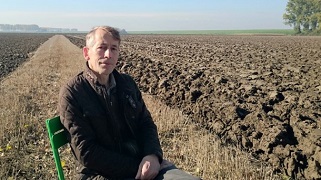
Chris De Stoop (Sint-Gillis-Waas, 14 januari 1958)
De Britse schrijver en journalist Edward St Aubyn werd geboren op 14 januari 1960 in Cornwall. Zie ook alle tags voor Edward St Aubyn op dit blog.
Uit: Dunbar
““We’re off our meds,” whispered Dunbar.
“We’re off our meds/ we’re off our heads,” sang Peter, “we’re out of our beds/ and we’re off our meds! Yesterday,” he continued in a conspiratorial whisper, “we were drooling into the lapels of our terry cloth dressing gowns, but now we’re off our meds! We’ve spat them out; we’ve tranquilized the aspidistras! If those fresh lilies you get sent each day . . .”
“When I think where they come from,” growled Dunbar.
“Steady, old man.”
“They stole my empire and now they send me stinking lilies.”
“Oh, you had an empire, did you?” said Peter, in the voice of an eager hostess, “you must meet Gavin in Room 33, he’s here in disguise, but his real name,” Peter lowered his voice, “is Alexander the Great.”
“I don’t believe a word of it,” grumbled Dunbar, “he’s been dead for years.”
“Well,” said Peter, now a Harley Street consultant, “if those troubled lilies were suffering from schizophrenic tendencies; tendencies, mind you, a little penchant for the schizoid, not the full-blown thing, their symptoms will have been mitigated with a minimum of fatal side effects.” He leant forward and whispered, “that’s where I put my dead meds: in the vase with the lilies!”
“I really did have an empire, you know,” said Dunbar. “Have I ever told you the story of how it was stolen from me?”
“Many times, old man, many times,” said Peter dreamily.
Dunbar heaved himself out of his armchair and after a couple of stumbling steps, straightened up, squinting at the strong light that slanted through the reinforced glass of his premium cell.
“I told Wilson that I would stay on as non-executive chairman,” Dunbar began, “keeping the plane, the entourage, the properties, and the appropriate privileges, but laying down the burden–” he reached over to the large vase of lilies and lowered it carefully to the floor, “laying down the burden of running the Trust from day to day. From now on, I told him, the world will be my perfect playground and, in due course, my private hospice.”
“Oh, that’s very good,” said Peter, “ ‘the world is my private hospice,’ that’s a new one.”
“ ‘But the Trust is everything,’ Wilson told me.” Dunbar grew more agitated as he moved into the story. “ ‘If you give that away,’ he said, ‘you’ll have nothing left. You can’t give something away and keep it at the same time.’ ”
“It’s an untenable position,” Peter cut in, “as R. D. Laing said to the Bishop.”
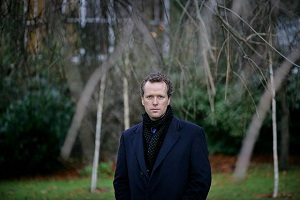
Edward St Aubyn (Cornwall, 14 januari 1960)
De Chinese schrijfster Anchee Min werd geboren in Shanghai op 14 januari 1957. Zie ook alle tags voor Anchee Min op dit blog.
Uit: The Cooked Seed
“I entered a stall and closed the door. I had never seen such a spacious and clean toilet room. A roll of paper came into view. It was pure white and soft to the touch. I wondered how much it would cost. I would not use it if I had to pay. I sat down and pulled the paper a few inches. I looked around and listened. No alarm went off. I was not sure if I was allowed to use the paper. I dragged out a foot more, and then another foot. I put the paper under my nose and smelled a lovely faint scent. Perhaps it was free, I decided. Carefully, I wiped my behind with the paper. It didn’t scratch my buttocks. What an amazing feeling. I grew up with toilet paper that felt like sandpaper. In fact, it was what I had packed in my suitcase—toilet paper made of raw straw.
People with different colored eyes, hair, and skin confirmed that I was no longer in China. I hoped my seaweed hairstyle didn’t offend any-body. I inched forward in the line leading toward the immigration sta-tion. I heard the man behind the booth call, “Next!” My heart jumped out of my chest. I forced myself to step forward. My surroundings started to spin. I was face-to-face with an immigration officer. I wanted to smile and say, “Hello!” but my jaw locked. My mind’s eye kept seeing one image—a group of peasants trying to haul a Buddha statue made of mud across a river. The Buddha statue was breaking apart and dissolving into the water. Shaking, I held out my right arm and presented my passport. The officer was a middle-aged white man with a mustache. A big grin crossed his face as he greeted me with what I later came to learn was “Welcome to America!” My mind went blank. I tried to breathe. Was the man asking me a question or was it a greeting? Did he mean “Where are you from?” or “How are you?” I had been studying a book called English goo Sentences. Accord-ing to the book, “How do you do?” would be the first words you would say when you met someone for the first time. Obviously, this was not what the officer had said. How do I respond? Should I say, “I am very well, thank you, and how are you?” or “I am from China”? What if it was a greeting? Did I hear “America”? I thought I did. “America” meant “United States,” didn’t it? Did he say, “Why are you in America?” I could feel the officer’s eyes as they bore into me. I decided to give him my prepared response. Lifting my chin, I forced a smile. I pushed the words out of my chest the best I could: “Thank you very much!” The officer took my passport and examined it. “An ah Q?” he said. “Ah Q? A … Kee? A … Q?” On my passport, my first name was spelled “An-Qi.” I had no say in choosing the spelling of my name. The Pinyin spelling system was in-vented by the Communist government. If the actual name was pro-nounced “Anchee,” the Pinyin would spell it “An-Qi.” The Communist official in charge of Chinese language reform believed that a foreigner would pronounce “Chee” when he read “Qi.” No Chinese was allowed to spell their name any other way on their passport. Should I have answered “Yes, I am Ah-Q”? I didn’t think so. “Ah-Q” was the name of a famous Chinese idiot. If it was “Ah-B” or “Ah-C,” I would have gladly answered yes.”
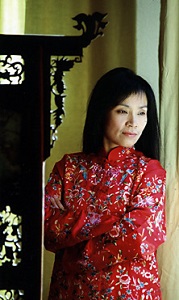
Anchee Min (Shanghai, 14 januari 1957)
De Japanse schrijver Yukio Mishima werd geboren op 14 januari 1925 in Tokyo. Zie ook ook alle tags voor Yukio Mishima op dit blog.
Uit: Spring Snow (Vertaald door Michael Gallagher)
“Released into the pond, they had bred rapidly. Once a snapping turtle got your finger in its beak, the servants told Kiyoaki, that was the end of it. There were several pavilions used for the tea ceremony and also a large billiard room. Behind the main house, wild yams grew thick in the grounds, and there was a grove of cypresses planted by Kiyoaki’s grandfather, and intersected by two paths. One led to the rear gate; the other climbed a small hill to the plateau at its top where a shrine stood at one corner of a wide expanse of grass. This was where his grand-father and two uncles were enshrined. The steps, lanterns, and torii, all stone, were traditional, but on either side of the steps, in place of the usual lion-dogs, a pair of cannon shells from the Russo-Japanese War had been painted white and set in the ground. Somewhat lower down there was a shrine to Inari, the harvest god, behind a magnificent trellis of wisteria. The anniversary of his grandfather’s death fell at the end of May; thus the wisteria was always in full glory when the family gathered here for the services, and the women would stand in its shade to avoid the glare of the sun. Their white faces, powdered even more meticulously than usual for the occasion, were dappled in violet, as though some exquisite shadow of death had fallen across their cheeks. The women. No one could count exactly the multitude of women who lived in the Matsugae mansion. Kiyoaki’s grand-mother, of course, took precedence over them all, though she preferred to live in retirement at some distance from the main house, with eight maids to attend to her needs. Every morn-ing, rain or shine, Kiyoaki’s mother would finish dressing and go at once with two maids in attendance to pay her respects to the old lady.”
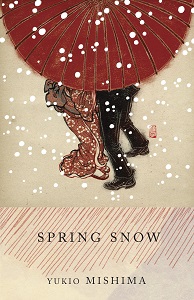
Yukio Mishima (14 januari 1925 – 25 november 1970)
De Oostenrijkse dichter en schrijver, musicus en cabaretier Martin Auer werd geboren op 14 januari 1951 in Wenen. Zie ook alle tags voor Martin Auer op dit blog.
Zufall
Wenn statt mir jemand anderer
auf die Welt gekommen wär’.
Vielleicht meine Schwester
oder mein Bruder
oder irgendein fremdes blödes Luder –
wie wär’ die Welt dann,
ohne mich?
Und wo wäre denn dann ich?
Und würd’ mich irgendwer vermissen?
Es tät ja keiner von mir wissen.
Statt mir wäre hier ein ganz anderes Kind,
würde bei meinen Eltern leben
und hätte mein ganzes Spielzeug im Spind.
Ja, sie hätten ihm sogar
meinen Namen gegeben!
Kim denkt
Wenn die Mäuse so groß wie Hunde wären,
dann müßten die Katzen so groß wie Tiger sein.
Und die Tiger wären dann so groß
wie Elefanten.
Aber die Elefanten wären so groß
wie Walfische, und die Walfische
so groß wie Ozeandampfer.
Und überhaupt müßte dann alles
viel größer sein, die ganze Welt, und die Häuser, die Bäume
und die Menschen, und Papa und Mama
und ich auch natürlich.
Alles müßte dann viel größer sein, damit alles
zusammenpaßt.
Aber wenn alles viel größer wäre,
dann würde man das
ja gar nicht merken.
?
Vielleicht sind die Mäuse wirklich so groß wie Hunde?
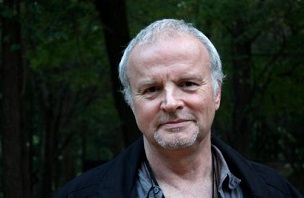
Martin Auer (Wenen, 14 januari 1951)
De Duitse schrijver en vertaler Andreas Steinhöfel werd geboren op 14 januari 1962 in Battenberg. Zie ook alle tags voor Andreas Steinhöfel op dit blog.
Uit: Rico, Oskar und die Tieferschatten
“Die Nudel lag auf dem Gehsteig. Sie war dick und geriffelt, mit einem Loch drin von vorn bis hinten. Etwas getrocknete Käsesoße und Dreck klebten dran. Ich hob sie auf, wischte den Dreck ab und guckte an der alten Fensterfront der Dieffe 93 rauf in den Sommerhimmel. Keine Wolken und vor allem keine von diesen weißen Düsenstreifen. Außerdem, überlegte ich, kann man Flugzeugfenster nicht aufmachen, um Essen raus zu werfen. Ich ließ mich ins Haus ein, zischte durch das gelb getünchte Treppenhaus rauf in den Dritten und klingelte bei Frau Dahling. Sie trug große bunte Lockenwickler im Haar, wie jeden Samstag. »Könnte ‘ne Rigatoni sein. Die Soße ist auf jeden Fall Gorgonzola«, stellte sie fest. »Lieb von dir, mir die Nudel zu bringen, Schätzchen, aber ich hab sie nicht aus dem Fenster geworfen. Frag mal Fitzke.« Sie grinste mich an, tippte sich mit dem Finger an den Kopf und verdrehte die Augen nach oben. Fitzke wohnt im Vierten. Ich kann ihn nicht leiden und eigentlich glaubte ich auch nicht, dass die Nudel ihm gehörte. Frau Dahling war meine erste Wahl gewesen, weil sie öfters mal was aus dem Fenster wirft, letzten Winter zum Beispiel den Fernsehapparat. Fünf Minuten später schmiss sie auch noch ihren Mann raus, den allerdings nur aus der Wohnung. Danach kam sie zu uns, und Mama musste ihr ein Schlückchen Gutes einschenken.
»Er hat eine Geliebte!«, hatte Frau Dahling verzweifelt erklärt. »Wenn die blöde Kuh wenigstens jünger wäre als ich! Schenken Sie mal nach!« Weil die Glotze jetzt im Eimer und der Mann weg war, hatte sie sich am nächsten Tag zum Trost einen todschicken Flachbild-Fernseher und einen DVD-Player gekauft. Seitdem gucken wir uns zusammen manchmal einen Liebesfilm an oder Krimis, aber nur an den Wochenenden, wenn Frau Dahling ausschlafen kann. Unter der Woche steht sie bei Karstadt am Hermannplatz hinter der Fleischtheke. Sie hat immer ganz rote Hände, so kalt ist es da. Während des Fernsehens essen wir Müffelchen mit Wurst und Ei oder Lachs. Bei Liebesfilmen schnieft Frau Dahling mindestens zehn Tempos voll, aber am Schluss schimpft sie dann immer los, von wegen, nun hätten der Kerl und die Frau sich also gekriegt und jetzt ginge das Elend erst richtig los, aber das würden die natürlich nie zeigen in den Filmen, so ein total verlogener Scheiß – noch ein Müffelchen, Rico? »Bleibt es bei heute Abend?«, rief Frau Dahling mir nach, als ich rauf in den Vierten rannte, immer zwei Stufen auf einmal. »Klar!«
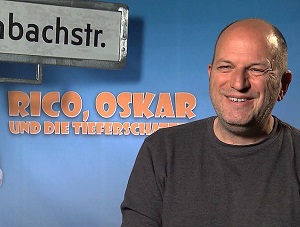
Andreas Steinhöfel (Battenberg, 14 januari 1962)
De Amerikaanse schrijver John Dos Passos werd geboren op 14 januari 1896 in Chicago. Zie ook alle tags voor John Dos Passos op dit blog.
Uit: The Big Money
“You know it’s quite dreadful here,” Ollie’s voice went on. “Prohibition and all that, it’s worse than the wildest imagination could con-ceive. I’ll come and pick you up with a cab.” All right, Ollie, I’ll be in the lobby.” Charley put on his tunic, remembered to leave off his Sam Browne belt, straightened his scrubby sandy hair again, and went down into the lobby. He sat down in a deep chair facing the revolving doors. The lobby was crowded. There was music coming from somewhere in back. He sat there listening to the dancetunes, looking at the silk stockings and the high heels and the furcoats and the pretty girls’ faces pinched a little by the wind as they came in off the street. There was an expensive jingle and crinkle to everything. Gosh, it was great. The girls left little trails of perfume and a warm smell of furs as they passed him. He started counting up how much jack he had. He had a draft for three hundred bucks he’d saved out of his pay, four yellowbacked twenties in the wallet in his inside pocket he’d won at poker on the boat, a couple of tens, and let’s see how much change. The coins made a little jingle in his pants as he fingered them over. Ollie Taylor’s red face was nodding at Charley above a big camels-hair coat. “My dear boy, New York’s a wreck. . . . They are pouring icecream sodas in the Knickerbocker bar….” When they got into the cab together he blew a reek of highgrade rye whiskey in Charley’s face. “Charley, I’ve promised to take you along to dinner with me…. Just up to ole Nat Benton’s. You won’t mind … he’s a good scout. The ladies want to see a real flying aviator with palms.” “You’re sure I won’t be buttin’ in, Ollie?” “My dear boy, say no more about it.” At the club everybody seemed to know Ollie Taylor. He and Charley stood a long time drinking Manhattans at a dark-paneled bar in a group of whitehaired old gents with a barroom tan on their faces. It was Major this and Major that and Lieutenant every time anybody spoke to Charley. Charley was getting to be afraid Ollie would get too much of a load on to go to dinner at anybody’s house. At last it turned out to be seventhirty, and leaving the final round of cocktails, they got into a cab again, each of them munching a clove, and started uptown. “I don’t know what to say to ‘em,” Ollie said. “I tell them I’ve just spent the most delightful two years of my life, and they make funny mouths at me, but I can’t help it.” There was a terrible lot of marble, and doormen in green, at the apartmenthouse where they went out to dinner and the elevator was inlaid in different kinds of wood. Nat Benton, Ollie whispered while they were waiting for the door to open, was a Wall Street broker. They were all in eveningdress waiting for them for dinner in a pinkishcolored drawingroom. They were evidently old friends of Ollie’s because they made a great fuss over him and they were very cordial to Charley and brought out cocktails right away, and Charley felt like the cock of the walk. There was a girl named Miss Humphries who was as pretty as a picture.”
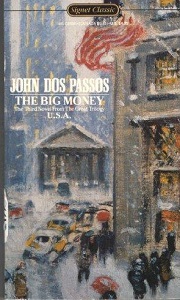
John Dos Passos (14 januari 1896 – 28 september 1970)
Cover
De Nederlandse dichter en schrijver Isaäc da Costa werd geboren in Amsterdam op 14 januari 1798. Zie ook alle tags voor Isaäc da Costa op dit blog.
De barre rots
Met het hoofd in de wolken,
de voet in de kolken,
staat bij golvengeklots
naakt en eenzaam de rots
Tevergeefs op zijn toppen
zijgen morgendaauwdroppen!
Tevergeefs ziet de maan
lieflijk starend hem aan!
En geen zomerluchtzwoelte
en geen avondwindkoelte
vermag iets op de aard
van het ijskoud gevaart’
waar zich bloemen noch bladen mosgroen op tonen,
en geen plant wordt gezien,
om des kruidkenners vlijt met een schat te belonen,
of de zeemeeuw een nest voor zijn jongen te biên!
Sombre steenrots! de lente keert weder,
’t dorre veld wordt bestrooid,
maar op u blikt zij vruchteloos neder!
op uw kruin past, voor krans
een verhevener glans
’k Zag een leger van golven de aanval beginnen
Zij liepen u aan,
met schelden en slaan,
met schuimende woede! Maar zouden zij ’t winnen?
Of ook over u heen heel haar menigte gaat,
zij breken, — gij staat.
Zij breken, zij wijken,
van veerkracht beroofd.
Daar verheft gij het hoofd;
statig ziet men het prijken
met paarlen van ’t zeenat, met edelgesteent’
als van ziltige tranen bij ’t zonlicht geweend.
Dus ook menig in God vastgeworteld gemoed!
wen der tegenheên vaak overstelpende vloed
voor een ogenblik tijds is geweken,
zij de bloesem van vroegere weelde vergaan,
zij ’t voor altijd op aard met vreugde gedaan,
voel’ zich ’t hart bij herhaling nog breken; —
toch verheft zich in vrede de geest naar omhoog,
bij de daauwdrop der smeltende smart in het oog,
en men beurt uit ons werelds gewemel,
als die eenzame rots
uit het golvengeklots,
naakt maar blinkend de kruin op ten hemel.
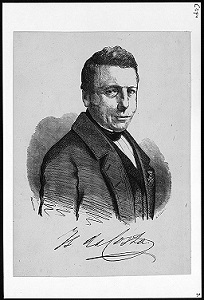
Isaäc da Costa (14 januari 1798 – 28 april 1860)
Zie voor nog meer schrijvers van de 14e januari ook mijn blog van 14 januari 2018 deel 2.

